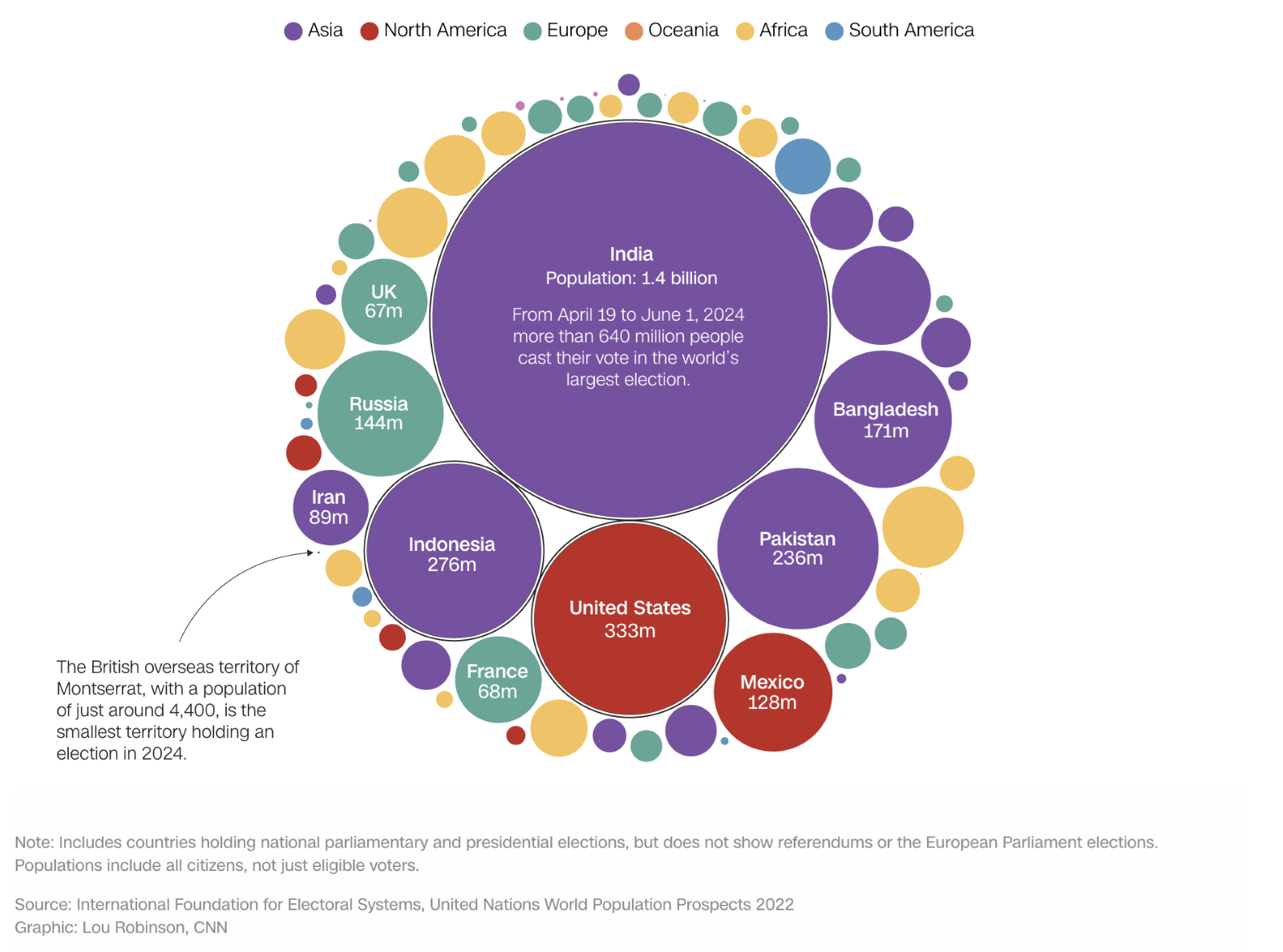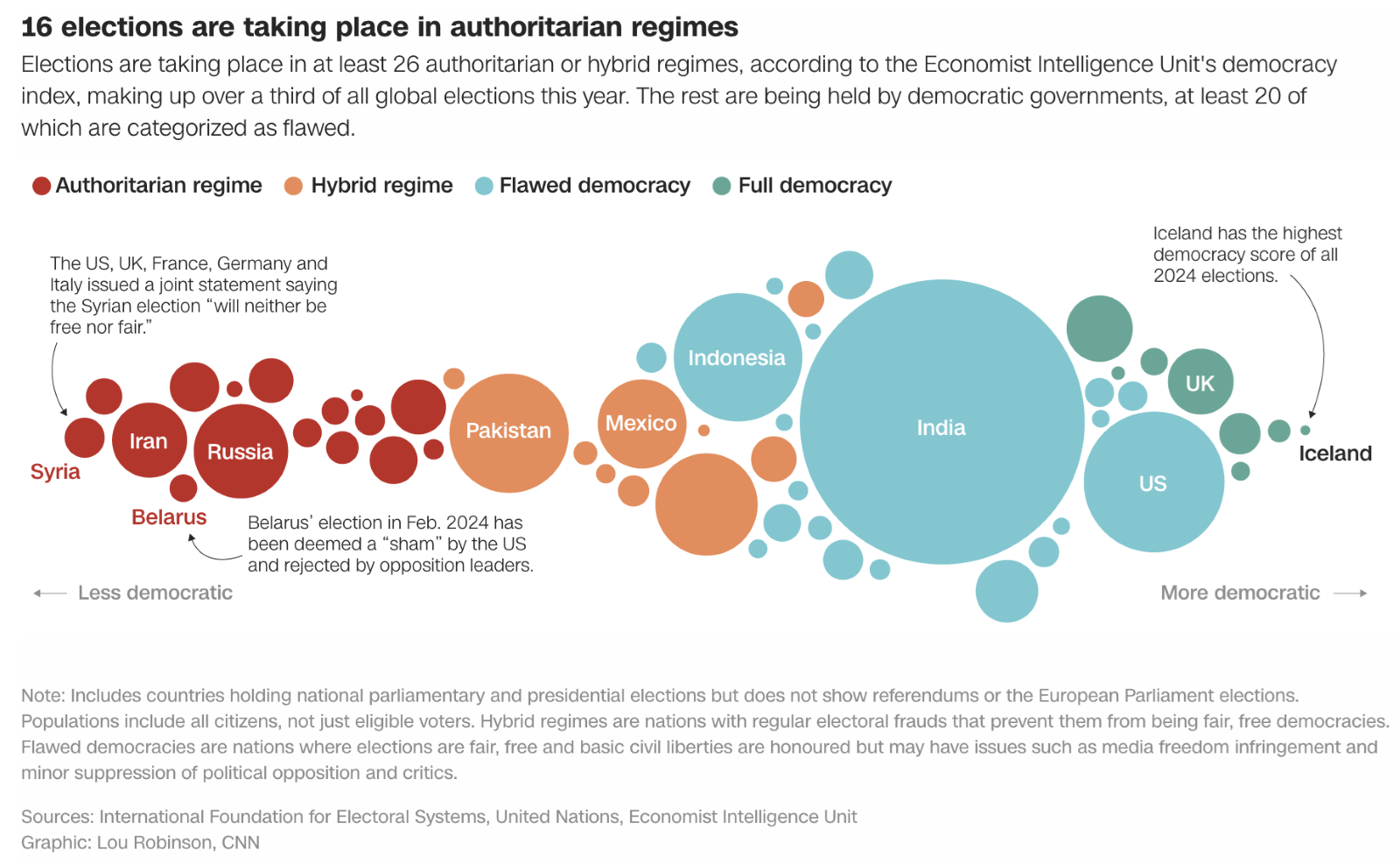
The 2024 national election cycle is rewriting the global political map as the world grapples with economic shocks and political turbulence. With more than 70 elections spanning the globe, this historic year reveals powerful trends of change, chaos, and coalition shifts that transcend borders. Discover how these dynamics are reshaping governance and what lies ahead in 2025.
Over the last few years, the global economy has lurched from one shock to the next as two brutal wars, stubborn inflation and high borrowing costs pockmark the post-pandemic recovery. This year, we have added a new source of turbulence - a jam-packed, year-long, worldwide national election calendar. By the end of 2024, we will have seen more than 70 national elections.
More than one billion people worldwide have already voted in 2024 and there are still more elections to go in this history-making year. In the end, eight of the world's ten most populous countries and over half of the top 25 countries will have had national elections. This represents around half of the world’s population and half its GDP.

Over the last ten-plus months, Destinations International staff has been closely watching what we feel are some of the critical elections – almost 40 in all. Through that, we have identified a few trends that we feel are important to be aware of – trends that supersede the political boundaries of a state or country. These trends follow.
Below, you will also find a country-by-country write-up on the individual elections we have tracked to date, a list of elections we think are worth watching before the year’s end, and a list of a few happening in 2025, including the Canadian national election.

Election Trends
More than anything, we see that it is not about the right or the left. It is about change. Change is becoming a value in its own right. Many voters may bypass policies and solutions they agree with because they feel the situation is so desperate that they want change at any cost. The second thing is that we see that responses that resonate are not necessarily about policy but instead about responding to and reducing chaos. Winners successfully position themselves as an opportunity for change and an opportunity to stop the chaos and establish stability.
Political coalitions are realigning. In the United States specifically, we are seeing the population break into camps based on education in ways that have never been so defined. Older, established ruling parties are losing supporters. This is particularly true in Europe. Loosely organized political parties are suspectable to takeovers. The Conservative Party of British Columbia in Canada is an excellent example. Many would argue that the Republican Party in the United States is another. Finally, traditional secondary parties have opportunities to expand their appeal. The Reform UK Party is an example of this. Elections in Canada and Germany will also likely provide further examples next year.
Elections are still in the pipeline for 2024, including in the countries of Georgia, Ghana, Namibia, and Romania.
National Elections Coming in 2025
2025 will see a German election by September 28, 2025, and a Canadian national election by October 20, 2025. Frankly, we see these elections being called sooner than those dates. What will drive that is when the minority coalition parties in the governing coalitions feel they have created enough separation from the governments they are part of. The junior partners in Canada are already moving in that direction as they have severed the ruling agreement.
There will also be national elections in Chile, Honduras, Jamaica, Poland (Presidential Election), Czech Republic (Czechia), Iceland, Ireland, Norway and Australia.
Recommended Post-Election Activities
In those countries that have gone through recent elections, it will be critical for destination organizations to begin addressing the following.
- Develop a post-election advocacy strategy.
- If possible, use the post-election time as an urgency driver for your advocacy campaigns. Can changes be made in a “Lame Duck Session” before the new legislature and executives are sworn in?
- Plan for and begin building relationships with new officials.
- Plan your response to personnel changes in executive or regulatory agencies.
- Refresh your stakeholder engagement plan.
Election Results from Around the Globe
Africa
Madagascar: According to provisional results by the National Electoral Commission, the ruling coalition led by President Andry Rajoelina’s (who was elected just six months before) center-left party narrowly lost its majority, winning 80 of 163 seats in the National Assembly. However, according to official results released in late June, the coalition retained its majority with 84 seats amid allegations of voter fraud and a crackdown on the political opposition. A seeds of change election.
Rwanda: President Kagame, who has led the country since 2000, won more than 99% of the vote in an election with no serious political opponents. However, Kagame’s ruling party retained its majority in the Chamber of Deputies by a smaller margin than the last election. We are watching this election closely because Rwanda has made a major effort to bolster itself as a travel and tourism destination. While the ruling party retained a majority, given the party's strength, the smaller margin suggests the seeds of a change election.
Senegal: The challenger, Bassirou Diomaye Faye, whom the popular opposition leader supported won 54% of the vote, a margin of over 18% over the second-place candidate who was the current President’s preferred successor. It is worth noting that the election occurred just days after Diomaye Faye’s release from prison. This result marks a sharp break from the decades-old ruling coalition. Since then, the new President has dissolved the opposition-led national assembly and called for a snap legislative election on November 17th. A change election.
South Africa: The African National Congress, which has ruled South Africa since its first democratic elections in 1994, lost its majority in parliament for the first time. The ANC formed an uneasy coalition with a white-led rival party, the Democratic Alliance, to create what they dubbed a “national unity” government. While the ANC is still the largest party, losing the majority makes this a change election.

Asia
Bangladesh: The incumbent Prime Minister secured a fourth term as her party and its allies won 225 out of 300 National Parliament seats. However, it was primarily an uncontested election after the main opposition party boycotted it. In August, the Prime Minister resigned and fled the country, and the parliament was dissolved amid mass anti-government protests. An interim government was installed and has promised fresh elections after “vital reforms” were made to state institutions: a change movement and election.
Bhutan: Economic frustrations in the landlocked kingdom of less than one million people thrust the former Prime Minister, who led from 2013 to 2018, back into power after his Party won a majority of seats in the National Assembly in a rebuke to the previous government. A change election.
India: Prime Minister Modi secured a third term, though his party lost its outright majority in the legislature for the first time in a decade. Observers say the result likely stems from voters’ economic frustrations and may temper the BJP’s domestic policy ambitions while having a smaller impact on Modi’s foreign policy assertiveness. A seeds of change election.
Indonesia: A 72-year-old former general whom the U.S. once condemned for alleged human rights abuses won the Indonesian presidency after being tacitly endorsed by the outgoing popular President and selecting the outgoing president’s son as his running mate. He ran on a continuity platform, pledging to continue to prioritize economic development and maintain the country’s relative neutrality on the world stage while campaigning on a populist nationwide free school lunch program. A status quo result.
Iran: Conservative candidates won most of the seats in the Islamic Consultative Assembly, Iran’s parliament, and the Assembly of Experts, which selects the country’s Supreme Leader. However, the election had the lowest turnout since the country’s 1979 revolution, as activists called for a boycott. Usually, a low turnout signals satisfaction with the way things are going. In this case, we view this as the opposite. Given how tightly things are controlled in Iran, I will put this in the change column.
Maldives: President Mohamed Muizzu’s People’s National Congress party won a shock landslide victory, cementing his power and affirming his efforts to tilt the archipelagic nation toward China and away from its traditional ally India, which recently began a tourist boycott of the popular vacation destination. A move for the status quo.
Mongolia: Amid frustrations about the economy and corruption, the center-left ruling Mongolian People’s Party lost its supermajority but narrowly retained a parliamentary majority—winning 68 of 126 seats, according to preliminary results. Many observers say the strong turnout (nearly 70%) and gains made by the opposition suggest a “desire for some change.” A seeds of change election.
Pakistan: Despite Pakistan’s powerful military “brazenly” rigging the contest against a jailed former Prime Minister and his party, the candidates they backed won a plurality of parliamentary seats on an Election Day marred by violence, irregularities and allegations of voter fraud. Still, a military-backed coalition ultimately took power. A seeds of change election.
Sri Lanka: Marxist politician Anura Kumara Dissanayake, who campaigned on a platform of anti-corruption, won the South Asian nation’s first election held after a crippling political and economic crisis in 2022, which saw the former president ousted by protesters. A change election.
Taiwan: In Taiwan’s much-watched election, the Beijing-skeptical Democratic Progressive Party maintained the presidency but lost its majority in the Legislature. This one was kind of a draw.
Europe
Austria: The Russia-friendly Freedom Party narrowly beat the ruling conservative Austrian People’s Party to win the far-right’s most significant victory in a legislative election since World War II—though it fell short of an outright majority to form the government. All four other parties in parliament have rejected forming a coalition with Freedom Party leader Herbert Kickl, a polarizing figure. As a result, Austria’s president asked the country’s three strongest political parties to hold talks on possible cooperation.
Belgium: The conservative New Flemish Alliance retained its position as the biggest party in parliament after winning 25.6% of the vote, while the far-right Vlaams Belang party took 21.8%. The Prime Minister resigned after a poor showing by his liberal party. Belgium has been without a formal government for nearly two years, leaving a country already divided by language and politics to endure a pandemic with lame-duck caretakers wielding emergency powers. A fragile coalition government finally took power recently, ending one of the longest political stalemates in the Western world. Cobbled together from seven political parties, the partnership keeps a growing far-right movement at bay. It should allow the country to finally pass a budget and consider a Covid-19 recovery package. Not sure how to classify this election except perhaps a realization that something had to change, and results needed to be achieved.
Bulgaria: The election, the country’s sixth in just three years, prompted by the collapse of the ruling coalition led by the conservative GERB party and the reformist We Continue the Change party, and comes in the wake of massive anti-corruption protests and a series of failed coalition governments. GERB won a plurality of seats in a June election, but political instability continued, and after multiple failed attempts to form a government, new snap elections were called for October. The Balkan country has been plagued by revolving-door governments since anti-graft protests in 2020 helped topple a coalition led by the center-right GERB party. Elections on October 27 produced little change from the previous election. Negotiations are ongoing, and there is an urgency to form some government. We will continue to watch.
Czech Republic (Czechia): The ruling coalition retained its majority in the Senate election, though the opposition party made historic gains, winning eight out of 27 contested seats in the 81-member Senate. It is somewhat of a status quo, but the seeds of change have been planted.
European Union: The conservative coalition known as the European People’s Party won 190 out of 720 seats—the most of any party—signifying a rightward lurch for the E.U.’s lawmaking body. However, incumbent European Commission President Ursula von der Leyen, a centrist, maintains a narrow path to governance (and another term) via a center coalition. President von der Leyen has stepped in to broker a deal among major groups and salvage the new Commission. Political maneuvering between the key center-right European People's Party and the Socialist & Democrats has put the process of agreeing on the next European Commission on ice as candidates remain subject to final approvals. A seeds of change election.
Finland: Alexander Stubb of the center-right National Coalition Party narrowly won Finland's presidential election runoff, defeating liberal Green Party member Pekka Haavisto. Stubb is pro-European and a strong supporter of Ukraine who has taken a tough stance towards Russia. Finland's new head of state will be responsible for its security and foreign policy, including the recently approved NATO member's stance towards Russia, with which it shares a long border. Given those recent changes, this election can be seen as a cautious endorsement of the recent change.
France: Citizens and world leaders celebrated after French voters rejected Marine Le Pen’s far-right National Rally. But though the leftist New Popular Front coalition won the most parliamentary seats, also placing ahead of French President Emmanuel Macron’s centrist alliance, it fell short of securing a majority, leaving a rare hung parliament that leaves the government facing uncertainty and likely instability. In September, Macron finally unveiled a new government dominated by conservatives and centrists, signaling a shift to the right. The seeds of change have been planted.
Moldova: Moldova's pro-EU President Maia Sandu has claimed a second term after a tense election run-off seen as a choice between Europe and Russia. Sandu won 55% of the vote, according to preliminary results. Her rival Alexandr Stoianoglo, backed by the pro-Russian Party of Socialists, had called for a closer relationship with Moscow. A status quo election.
North Macedonia: The nationalist VMRO-DPMNE party defeated the incumbent center-left President to become the country’s first female President. Meanwhile, the party won a plurality of 55 out of 120 parliamentary seats, fueled by voters’ anger at the country’s slow integration into the European Union. A change election.
Portugal: In snap legislative elections called early after last year's resignation of the center-left Prime Minister, the center-right won a slim plurality in the country’s closest-ever parliamentary polls. This saw the rise of the far-right Chega party. The Center-Right parties formed a minority government that left out the Chega party. Still, the growth of the Chega Party threatens to disrupt the long two-party whose coalitions have dominated since Portugal’s revolution in 1974. A seeds of change election.
United Kingdom: The Tories, plagued in recent years by scandals, simmering public dissatisfaction, and rocky leadership changes, were heavily defeated by the Labour Party led by now Prime Minister Keir Starmer. In his victory speech, Starmer declared: “Change begins now.” However, while the Labour Party has a significant majority of seats, it is based on one of the lowest pluralities ever (33.7%) and not on a wide base of support that gives them a strong mandate. A change election without a strong consensus on the change required.
Pacific Ocean
Solomon Islands: The ruling Ownership, Unity and Responsibility (OUR) party, led by four-time Prime Minister Manasseh Sogavare, performed well below expectations. After Sogavare stepped down as leader of the party, which still won a plurality of 15 seats in the 50-member parliament, new OUR leader and former foreign minister Jeremiah Manele was elected Prime Minister by a secret ballot among fellow legislators. Manele is expected to continue pursuing closer relations with China as Washington and Beijing compete for influence in the Pacific.
Kiribati: The small island nation of 130,000, battling rising sea levels and rising cost of living, is considered a strategic spot for great power rivalry due to its location in the Pacific Ocean and proximity to Hawaii. The 2024 parliamentary election resulted in a supermajority for the ruling Tobwaan Kiribati Party, which was then able to block the nomination of opposition party candidates for the presidential election when parliament sat on 13 September 2024. The TKP nominated incumbent president Taneti Maamau, alongside three other members of the TKP described as "dummy candidates": Bautaake Beia from Washington (Teraina), Riteta Iorome from Onotoa, and Kaotitaake Kokoria from Fanning (Tabuaeran), all first-time members of parliament. A status quo election.
American Samoa: This election was held in concert with the United States general election. Republican incumbent Amata Coleman Radewagen was easily reelected. Pula Nikolao Pula, who is aligned with the Republicans, won a plurality election over current governor Lemanu Peleti Mauga, who is aligned with the Democrats. This represents a shift toward the Republican party, though, like some other elections, a vote where no one party represents a consensus.
Guam: This election was held in concert with the United States general election. Republican Eddie Calvo was re-elected governor with 64% of the vote. Democrats retained control of the island's legislature.
South America
Brazil: This was not a national election by definition, but instead a nationwide collection of local elections where voters were choosing Mayors, Vice Mayors, and Councillors in 5,570 municipalities. Centrist and center-right parties won city halls and consolidated control of town councils across much of Brazil municipal elections, underscoring a conservative shift in the country's electorate as the ruling Workers Party lost ground. That said, the ruling party scored key victories in some larger cities. A seeds of change election.
Venezuela: President Nicolás Maduro, whose rule since 2013 has been described as a dictatorship, was named the winner of Venezuela’s 2024 presidential election with 51% of the vote—though the results, which were announced after a delay, and contradicted by multiple exit polls and copies of vote tabulations in an overwhelming number of precincts have sparked skepticism among the domestic opposition and foreign leaders. A change election thwarted by the ruling government.

North America
El Salvador: President Nayib Bukele, the self-described “world’s coolest dictator” whose hardline crackdown has been credited with bringing down the country’s crime rate, was reelected with nearly 85% of the vote, while his New Ideas Party won a legislative supermajority, signaling massive public support for Bukele’s governance project despite accusations of democratic backsliding. A status quo result.
Panama: Amid widespread discontent about the economy and corruption, Panama’s ruling and largest party, the center-left Democratic Revolutionary Party, led by incumbent Vice President José Gabriel Carrizo, suffered massive electoral defeat in the presidential and parliamentary elections, while the right-wing Realizing Goals party won a plurality in both. José Raúl Mulino, initially the Realizing Goals running mate of former President Ricardo Martinelli, ended up topping the ticket and was elected President after Martinelli was convicted of money laundering and subsequently disqualified. A change election, though like some other elections, a vote where no one party represents a consensus.
Mexico: Claudia Sheinbaum of the populist left-wing Morena party, who positioned herself as a continuation of outgoing President Andrés Manuel López Obrador, won by a landslide to become the country’s first female President. Morena and her allies also dominated in the legislative elections, winning a two-thirds supermajority in the Chamber of Deputies (the lower house), and falling just short of the same in the Senate—setting the stage for Sheinbaum to try to implement sweeping reforms and address nationwide concerns like organized crime and gender-based violence. While an endorsement of the status quo, the status quo represents a dramatic change in the Mexican political structure that has been in place for decades and, therefore, can be viewed as an embrace of recent change in election results.
Puerto Rico: This election was held in concert with the United States general election. The current pro-statehood party held the governorship, though that may have resulted from a splintered opposition, resulting in the incumbent party winning with a plurality and not a majority. A non-binding vote of governance was won by the pro-statehood party, which won a majority in a ballot with three options. Whether this will lead to a movement toward statehood with a binding vote and an act of the US Congress is unclear.
United States: While we are still pouring through the results of the United States election, it appears that the election of Donald Trump as president reflects some of the trends we have identified. Stubborn inflation that has moderated but not receded, high borrowing costs, impressions of a lack of control of the Southern border, and a general feeling of not being heard about these issues were central. Change was the motivating factor for those who saw Kamala Harris and the Democrats as tied to an administration that seemed to many as unable to address the economic impact of these issues and the accompanying perceived chaos of rapid social, cultural and population changes. The Democrats did perform better than most ruling parties in Western democracies largely because of the chaos that many seem to see in Donald Trump and the Republican's governing style and aims. Party realignment continues in the United States, but neither side has really put together a long-lasting significant majority coalition that would allow us to proclaim a full political realignment. A seeds of change election.
Submit Your Thought Leadership

Share your thought leadership with the Destinations International team! Learn how to submit a case study, blog or other piece of content to DI.


